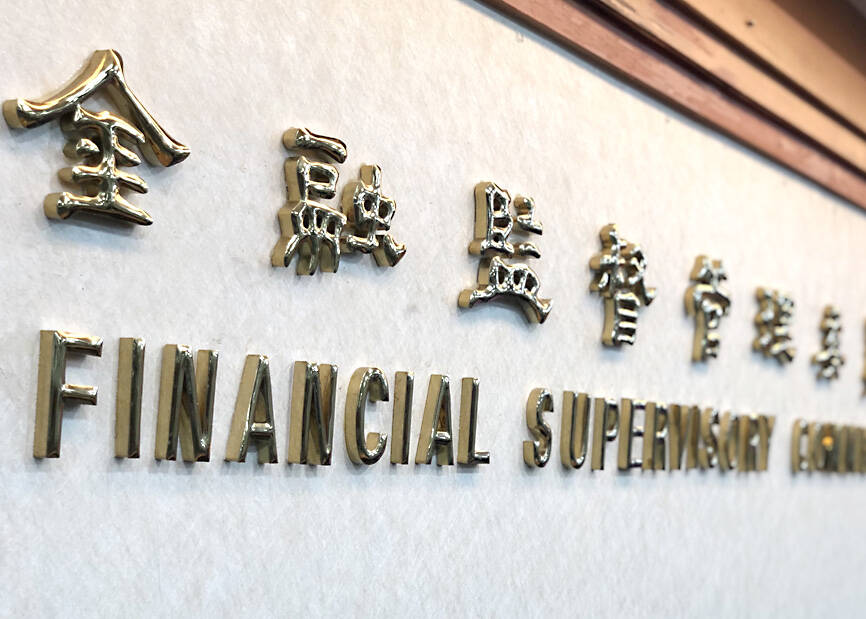The Financial Supervisory Commission (FSC) fined financial institutions and publicly listed firms NT$254.05 million (US$8.27 million) last year, slightly lower than the NT$254.62 million recorded in 2022, data from the financial regulator showed on Sunday.
Last year’s figure was the lowest since 2019, when the commission handed out penalties totaling NT$300.38 million to firms for financial services misconduct, and breaches related to internal controls and corporate governance, the data showed.
Last year’s fines were 77.33 percent of its target of NT$328.53 million in penalties, the commission said.

Photo: Kelson Wang, Taipei Times
The commission said the low total was because fines were handed out to firms to correct their deficiencies, not as a means of generating income.
In addition to fines, the regulator’s penalties include corrections, improvements, warnings and restrictions, as well as requiring that a company dismiss or suspend directors, supervisors and managers.
In Taiwan, financial institutions such as banks, insurance companies, securities brokerages, futures firms and investment trust enterprises obtain special licenses from the government to operate.
They also face penalties and disciplinary measures from authorities — namely the Banking Bureau, the Insurance Bureau and the Securities and Futures Bureau — if they contravene laws and regulations.
The Banking Bureau fined firms NT$130.9 million last year, up 19.96 percent from a year earlier and accounting for 51 percent of all fines, the commission’s data showed.
Among the severest penalties was a NT$30 million fine imposed on CTBC Financial Holding Co (中信金控) in August for corporate governance breaches after a major shareholder was found to have improperly interfered in company operations.
The Securities and Futures Bureau issued fines totaling NT$70.70 million last year, up 6.54 percent from 2022, with the top fine of NT$1.8 million levied on Fubon Asset Management Co (富邦投信) for poor internal controls.
The Insurance Bureau handed out fines of NT$52.45 million — a 32.5 percent decline from a year earlier.

Semiconductor business between Taiwan and the US is a “win-win” model for both sides given the high level of complementarity, the government said yesterday responding to tariff threats from US President Donald Trump. Home to the world’s largest contract chipmaker, Taiwan Semiconductor Manufacturing Co (TSMC, 台積電), Taiwan is a key link in the global technology supply chain for companies such as Apple Inc and Nvidia Corp. Trump said on Monday he plans to impose tariffs on imported chips, pharmaceuticals and steel in an effort to get the producers to make them in the US. “Taiwan and the US semiconductor and other technology industries

SMALL AND EFFICIENT: The Chinese AI app’s initial success has spurred worries in the US that its tech giants’ massive AI spending needs re-evaluation, a market strategist said Chinese artificial intelligence (AI) start-up DeepSeek’s (深度求索) eponymous AI assistant rocketed to the top of Apple Inc’s iPhone download charts, stirring doubts in Silicon Valley about the strength of the US’ technological dominance. The app’s underlying AI model is widely seen as competitive with OpenAI and Meta Platforms Inc’s latest. Its claim that it cost much less to train and develop triggered share moves across Asia’s supply chain. Chinese tech firms linked to DeepSeek, such as Iflytek Co (科大訊飛), surged yesterday, while chipmaking tool makers like Advantest Corp slumped on the potential threat to demand for Nvidia Corp’s AI accelerators. US stock

The US Federal Reserve is expected to announce a pause in rate cuts on Wednesday, as policymakers look to continue tackling inflation under close and vocal scrutiny from US President Donald Trump. The Fed cut its key lending rate by a full percentage point in the final four months of last year and indicated it would move more cautiously going forward amid an uptick in inflation away from its long-term target of 2 percent. “I think they will do nothing, and I think they should do nothing,” Federal Reserve Bank of St Louis former president Jim Bullard said. “I think the

SUBSIDIES: The nominee for commerce secretary indicated the Trump administration wants to put its stamp on the plan, but not unravel it entirely US President Donald Trump’s pick to lead the agency in charge of a US$52 billion semiconductor subsidy program declined to give it unqualified support, raising questions about the disbursement of funds to companies like Intel Corp and Taiwan Semiconductor Manufacturing Co (台積電). “I can’t say that I can honor something I haven’t read,” Howard Lutnick, Trump’s nominee for commerce secretary, said of the binding CHIPS and Science Act awards in a confirmation hearing on Wednesday. “To the extent monies have been disbursed, I would commit to rigorously enforcing documents that have been signed by those companies to make sure we get